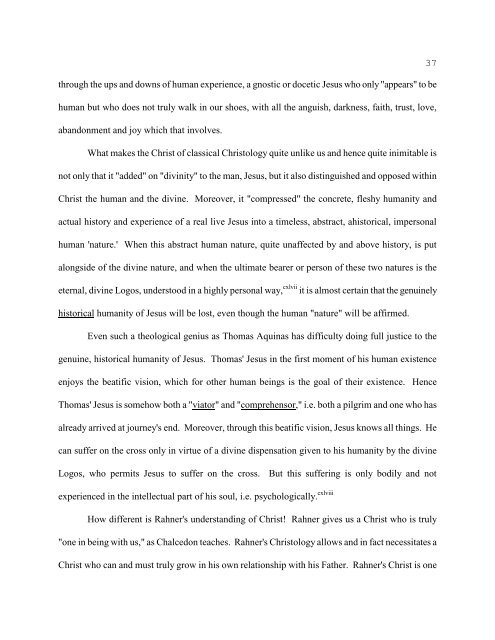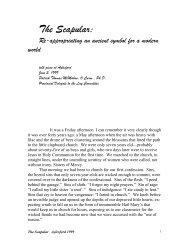Christocentrism of Charism – Buggert - CarmelStream
Christocentrism of Charism – Buggert - CarmelStream
Christocentrism of Charism – Buggert - CarmelStream
You also want an ePaper? Increase the reach of your titles
YUMPU automatically turns print PDFs into web optimized ePapers that Google loves.
through the ups and downs <strong>of</strong> human experience, a gnostic or docetic Jesus who only "appears" to be<br />
human but who does not truly walk in our shoes, with all the anguish, darkness, faith, trust, love,<br />
abandonment and joy which that involves.<br />
What makes the Christ <strong>of</strong> classical Christology quite unlike us and hence quite inimitable is<br />
not only that it "added" on "divinity" to the man, Jesus, but it also distinguished and opposed within<br />
Christ the human and the divine. Moreover, it "compressed" the concrete, fleshy humanity and<br />
actual history and experience <strong>of</strong> a real live Jesus into a timeless, abstract, ahistorical, impersonal<br />
human 'nature.' When this abstract human nature, quite unaffected by and above history, is put<br />
alongside <strong>of</strong> the divine nature, and when the ultimate bearer or person <strong>of</strong> these two natures is the<br />
eternal, divine Logos, understood in a highly personal way, cxlvii it is almost certain that the genuinely<br />
historical humanity <strong>of</strong> Jesus will be lost, even though the human "nature" will be affirmed.<br />
Even such a theological genius as Thomas Aquinas has difficulty doing full justice to the<br />
genuine, historical humanity <strong>of</strong> Jesus. Thomas' Jesus in the first moment <strong>of</strong> his human existence<br />
enjoys the beatific vision, which for other human beings is the goal <strong>of</strong> their existence. Hence<br />
Thomas' Jesus is somehow both a "viator" and "comprehensor," i.e. both a pilgrim and one who has<br />
already arrived at journey's end. Moreover, through this beatific vision, Jesus knows all things. He<br />
can suffer on the cross only in virtue <strong>of</strong> a divine dispensation given to his humanity by the divine<br />
Logos, who permits Jesus to suffer on the cross. But this suffering is only bodily and not<br />
experienced in the intellectual part <strong>of</strong> his soul, i.e. psychologically. cxlviii<br />
How different is Rahner's understanding <strong>of</strong> Christ! Rahner gives us a Christ who is truly<br />
"one in being with us," as Chalcedon teaches. Rahner's Christology allows and in fact necessitates a<br />
Christ who can and must truly grow in his own relationship with his Father. Rahner's Christ is one<br />
37



